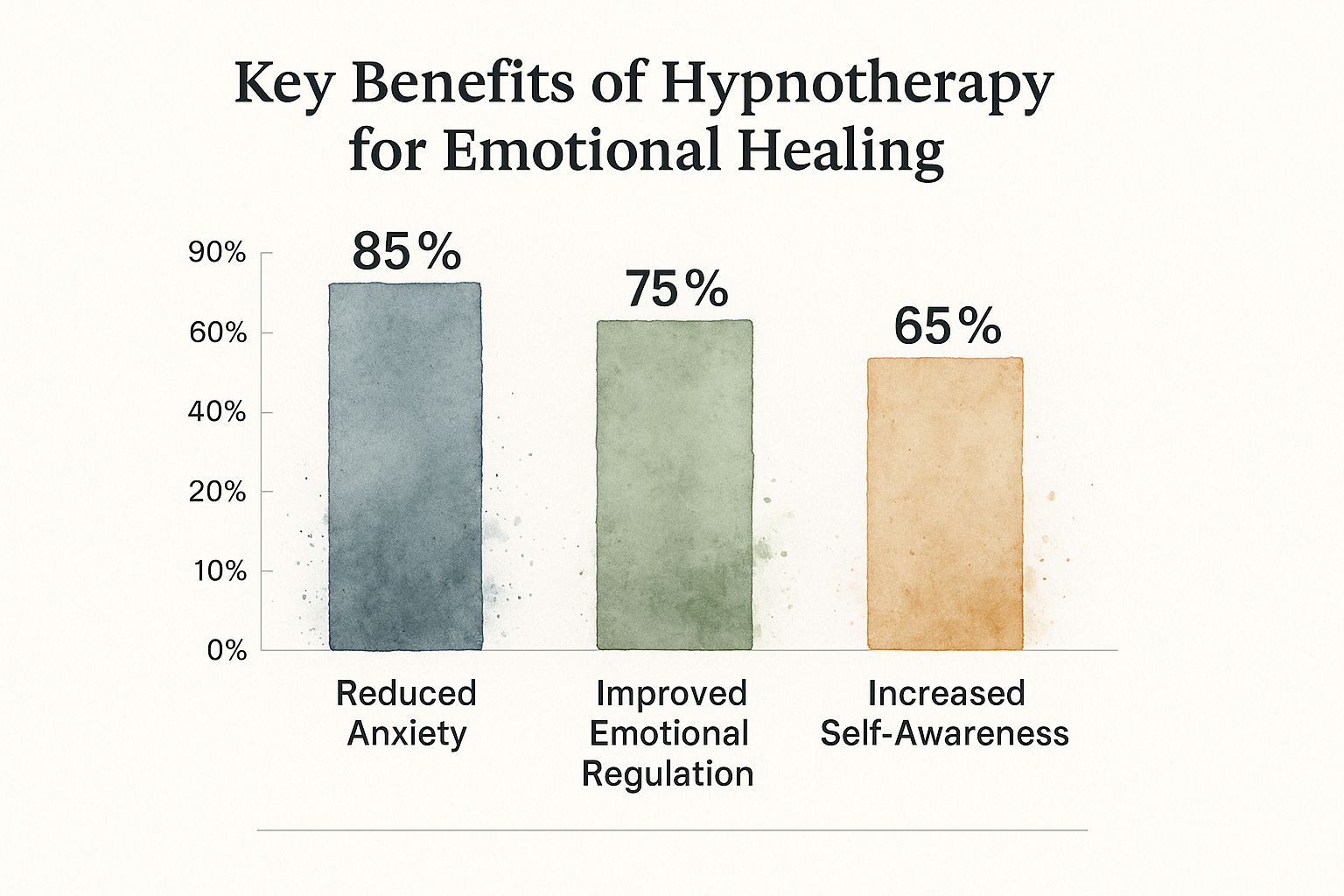Hypnotherapy for Emotional Healing: Transform Your Mind
- Sreemanti Gijare
- May 6
- 12 min read
Updated: May 7
The Truth About Hypnotherapy for Emotional Healing

Many associate hypnotherapy with stage performances, but clinical hypnotherapy offers a different approach. It's a therapeutic method providing access to the subconscious mind, the storehouse of our emotions and memories. Traditional talk therapy sometimes struggles to reach this deep level, making hypnotherapy a potentially more effective route to genuine emotional healing.
This access to the subconscious allows hypnotherapy to achieve breakthroughs where other methods may fall short. Ingrained patterns of anxiety, grief, or trauma can be addressed more directly. The relaxed state of hypnosis bypasses mental resistance to change, fostering receptivity to healthier thinking and feeling.
Understanding the Rise of Hypnotherapy in the UAE
The growing interest in hypnotherapy for emotional healing is part of a larger global trend. The market, valued between $12.04 and $15.65 billion, is projected to expand significantly. This is likely driven by the increasing prevalence of mental health issues. While specific data for the UAE is limited, these global trends suggest a similar rise in the region, potentially influenced by factors such as expatriate stress and demanding work environments. More statistics can be found here: Hypnotherapy Market Analysis. In the UAE, with its focus on holistic well-being, incorporating therapies like hypnotherapy aligns with the region's evolving wellness landscape.
How Hypnotherapy Works on an Emotional Level
Hypnotherapy for emotional healing is more than just relaxation. It's about active engagement with the subconscious. During a session, a trained hypnotherapist guides you into deep relaxation, focusing your attention inward. This heightened awareness allows access to emotional patterns and beliefs that contribute to challenges.
Furthermore, hypnotherapy empowers you to reframe negative thoughts and beliefs that fuel emotional distress. This involves identifying unhelpful thought patterns and replacing them with positive, empowering ones. This can be especially beneficial in the diverse cultural setting of the UAE, where individuals may carry emotional baggage related to cultural identity or societal pressures.
By targeting the root causes of emotional distress within the subconscious, hypnotherapy offers a powerful path to lasting emotional healing and transformation. It enables a shift from managing symptoms to achieving genuine, long-term emotional well-being. This approach can be particularly valuable for those seeking solutions that resonate with both their personal and cultural experiences.
The Neuroscience Behind Emotional Transformation
Hypnotherapy, when used for emotional healing, goes beyond simple relaxation techniques. It delves into the complex mechanisms of the brain, creating measurable shifts in the regions responsible for managing our emotional responses. These aren't just temporary changes; they represent a fundamental rewiring of neural pathways connected to emotional distress. This rewiring leads to lasting transformation, offering more than just temporary relief.
How Hypnotherapy Rewires the Brain
Hypnotherapy induces a unique mental state where the subconscious mind becomes more accessible. This is essential because the subconscious holds deeply ingrained emotional patterns, often beyond the reach of conscious effort. Imagine an iceberg: the conscious mind is the tip above the water, while the vast subconscious resides beneath the surface. Hypnotherapy allows us to explore and reshape this hidden landscape.
This hypnotic state facilitates the rewiring of neural pathways, weakening connections associated with negative emotions and strengthening those linked to positive ones. It's like forging new, healthier trails in a forest, gradually replacing overgrown paths that lead to undesirable places. You can explore related topics on our blog: Our sitemap of blog categories.
The Impact on Emotional Processing
Specific brain regions exhibit significant changes during hypnotherapy. The amygdala, known as the brain's emotional center, shows decreased activity, resulting in less intense emotional reactions. Simultaneously, the prefrontal cortex, responsible for rational thought and decision-making, becomes more active. This increased activity promotes clearer thinking and helps regulate emotional responses.
To better understand these changes, let's examine the following table:
Brain Activity Changes During Hypnotherapy This table shows how different brain regions respond during hypnotherapy sessions compared to normal waking states, particularly in relation to emotional processing.
Brain Region | Normal State Activity | Hypnotic State Activity | Impact on Emotional Healing |
|---|---|---|---|
Amygdala | High activity, especially during emotional triggers | Reduced activity | Less intense emotional reactions, improved emotional regulation |
Prefrontal Cortex | Moderate activity | Increased activity | Enhanced rational thought, improved decision-making in emotionally charged situations, better control over emotional responses |
As you can see, the shift in activity between the amygdala and prefrontal cortex plays a crucial role in emotional healing. By reducing the intensity of emotional reactions and promoting rational thought, hypnotherapy helps individuals process and manage their emotions more effectively.
The increasing focus on emotional healing within the hypnotherapy market underscores its growing significance. Global projections anticipate a 23.8% compound annual growth rate for mind-healing therapies. Hypnotherapy Market Report. This trend aligns with the rise of online hypnotherapy, making emotional support resources more accessible.
Combining Hypnotherapy for Enhanced Results
Some practitioners combine hypnotherapy with other therapeutic approaches to maximize benefits. Integrating techniques like mindfulness and Cognitive Behavioral Therapy (CBT) can create a more comprehensive and personalized treatment plan. This integrated approach is especially relevant in multicultural environments, where emotional expression and coping mechanisms vary widely. Recognizing these cultural nuances is essential for delivering effective treatment.
Emotional Challenges That Respond to Hypnotherapy
Hypnotherapy offers a powerful approach to emotional healing, but it's not a universal solution. Its effectiveness shines brightest when addressing specific emotional challenges. This exploration delves into the evidence supporting hypnotherapy's benefits for issues like anxiety, trauma, grief, phobias, and depression. We'll also consider how these techniques can be adapted to address unique challenges, especially for those in the UAE.

This infographic visually represents the key benefits of hypnotherapy for emotional healing. It showcases percentage improvements observed in areas such as anxiety, emotional regulation, and self-awareness. The data indicates that a significant number of individuals experience notable positive changes in these areas through hypnotherapy.
Anxiety and Phobias: Calming the Inner Storm
Hypnotherapy excels in the management of anxiety and phobias. By accessing the subconscious mind, hypnotherapists can help individuals pinpoint and reframe the root causes of their anxieties.
For instance, someone struggling with social anxiety might uncover underlying beliefs about personal inadequacy or a fear of judgment. Hypnotherapy offers a path to challenge these beliefs and replace them with more positive self-perceptions. Similarly, phobias, frequently originating from past experiences, can be addressed by reframing the associated memories and desensitizing the individual to the feared object or situation.
Trauma and Grief: Processing the Past
Hypnotherapy creates a safe and supportive space for processing past trauma and grief. Techniques like regression therapy enable individuals to revisit past events in a controlled setting, fostering understanding and releasing associated emotional pain.
This process can be especially beneficial for expatriates in the UAE, who may be grappling with grief related to distance from family or adapting to a new culture. Culturally sensitive approaches are essential, acknowledging the diversity of emotional expression and coping mechanisms across different communities.
Depression: Finding the Light Within
While hypnotherapy should not be considered the sole treatment for clinical depression, it can be a valuable component of a broader treatment plan. Understanding the interplay between hypnotherapy and the brain’s capacity for change, known as neuroplasticity, can illuminate its power in emotional healing. You can learn more about this concept through resources like neuroplasticity in hypnotherapy.
Hypnotherapy can help individuals identify and challenge negative thought patterns that contribute to depression. Furthermore, it can foster self-esteem and motivation, empowering individuals to take proactive steps toward recovery. This is especially pertinent in demanding environments such as Dubai's corporate world, where burnout and performance anxiety are prevalent.
Addressing Specific Challenges in the UAE
The UAE's distinct cultural landscape presents specific emotional challenges. Expatriates commonly experience adjustment stress, cultural identity conflicts, and feelings of loneliness. Hypnotherapy offers a valuable tool to navigate these issues.
Culturally sensitive hypnotherapists can assist individuals in managing these complexities, building emotional resilience and a sense of belonging. This support is vital for long-term well-being and successful integration into the UAE community.
Understanding the Limitations
Hypnotherapy, while effective, is not a quick fix. It is most beneficial when integrated into a comprehensive approach to emotional healing. For complex or severe mental health conditions, seeking professional guidance from a psychiatrist or psychologist is paramount.
Hypnotherapy can complement traditional therapies, providing additional support and potentially accelerating progress. By acknowledging its limitations and strategically combining it with other approaches, individuals can optimize their chances of achieving lasting emotional well-being.
To understand the effectiveness of hypnotherapy across various emotional challenges, the following table summarizes success rates, average sessions required, and potential complementary approaches.
Effectiveness of Hypnotherapy by Emotional Condition
Emotional Condition | Success Rate | Average Sessions Required | Complementary Approaches |
|---|---|---|---|
Anxiety | 70-80% | 6-10 | Cognitive Behavioral Therapy (CBT), Mindfulness |
Phobias | 80-90% | 4-8 | Exposure Therapy, Relaxation Techniques |
Trauma | 60-75% | 10-20 | Eye Movement Desensitization and Reprocessing (EMDR), Talk Therapy |
Grief | 70-85% | 6-12 | Bereavement Counseling, Support Groups |
Depression | 50-65% | 8-15 | Medication, Psychotherapy |
Note: Success rates and average sessions required can vary based on individual factors and the severity of the condition.
This table illustrates the potential benefits of hypnotherapy for a range of emotional challenges, while also highlighting the importance of considering complementary approaches for a more holistic and effective treatment plan. The varying success rates underscore the individualized nature of hypnotherapy and the need for personalized treatment plans.
Inside A Hypnotherapy Session

Embarking on a hypnotherapy journey for emotional healing is a truly personal experience. It's a guided process, starting with an initial consultation and moving towards a sense of resolution. This section offers a glimpse into what unfolds during these sessions, from both the hypnotherapist's and the client's viewpoints. Hypnotherapy can be combined with other natural approaches to well-being. For example, some individuals find that CBD oil for anxiety can offer additional support.
The Personalized Approach To Emotional Healing
Effective hypnotherapists understand that emotional healing is not a standardized procedure. They tailor their methods to each individual's unique emotional needs. Instead of generic scripts, they develop personalized strategies. This includes careful consideration of your background, cultural context, and specific emotional difficulties. This individualized attention is especially vital in culturally diverse environments like the UAE. You can explore further related information on our blog post sitemap.
Exploring Powerful Hypnotherapy Techniques
Hypnotherapy employs a variety of techniques for emotional healing. Regression therapy, for instance, gently guides you to revisit past experiences contributing to current challenges. This is not about reliving trauma, but gaining new insights and releasing emotional burdens.
Parts therapy helps resolve inner conflicts by addressing different aspects of the self. This can be particularly beneficial for managing conflicting desires or overcoming self-sabotaging habits.
Finally, reframing transforms limiting beliefs into empowering ones. For example, the belief "I'm not good enough" could be reframed into "I am capable and worthy."
The Hypnotherapy Experience In The UAE
Hypnotherapy in the UAE reflects the region's rich cultural tapestry. Practitioners sensitive to these nuances adapt their approaches accordingly. They understand that emotional expression and coping strategies vary significantly across different cultural backgrounds. This culturally informed approach makes hypnotherapy more effective for both residents and expatriates.
What To Expect During A Session
Many individuals approach hypnotherapy with preconceived ideas. They may worry about losing control or being forced to divulge secrets. In actuality, you remain aware and in control throughout the session. You might experience deep relaxation, a sense of detachment, or even vivid imagery. These are normal responses. It's crucial to have realistic expectations about these sensations. The process is collaborative, between you and your hypnotherapist, focused on achieving your emotional healing goals.
Gauging Your Progress
How can you tell if hypnotherapy is working for you? Several indicators can signal progress. You may notice reduced anxiety, improved emotional control, or a heightened sense of self-awareness. You might also experience behavioral shifts, such as making healthier choices or setting firmer boundaries. Open communication with your hypnotherapist is essential for monitoring progress and adjusting your treatment plan as needed. It's a journey of self-discovery, and your feedback is crucial for its success.
Becoming Your Own Emotional Healing Guide

Hypnotherapy offers incredible benefits for emotional healing, and these benefits can extend far beyond the therapist's office. Self-hypnosis empowers you to take control of your emotional well-being and continue your healing journey independently. It provides practical tools you can use anywhere to manage stress, overcome personal challenges, and cultivate a sense of inner peace.
A Step-by-Step Guide to Self-Hypnosis
Self-hypnosis involves guiding yourself into a deeply relaxed and focused state. It's similar to meditation, but with a specific therapeutic goal in mind. Here’s a simple approach to get you started:
Find a quiet space: Select a comfortable, distraction-free environment where you can truly relax without interruptions.
Relax your body: Start by taking slow, deep breaths, consciously releasing tension from your muscles with each exhale.
Focus your mind: Concentrate on a specific image, physical sensation, or a single word. This helps to quiet the constant mental chatter.
Deepen the state: Visualize yourself descending a staircase or peacefully floating on a cloud. These images can help deepen your sense of relaxation.
Introduce suggestions: Once you're in a deeply relaxed state, offer yourself positive affirmations or guided visualizations that align with your emotional healing goals.
Return to awareness: Gently bring yourself back to full waking awareness. You should feel refreshed and centered.
Crafting Personalized Affirmations
Affirmations are positive statements designed to reprogram your subconscious mind. For maximum effectiveness, personalize your affirmations to reflect your specific needs and cultural context.
For example, if you frequently struggle with self-criticism, an affirmation could be, "I accept myself fully and unconditionally." If you are navigating cultural identity challenges in the UAE, an affirmation might be, "I embrace and celebrate my cultural heritage." This personal touch significantly enhances the impact of your affirmations.
Integrating with Other Wellness Practices
Self-hypnosis works wonderfully alongside other wellness practices that are popular in the UAE. Combining it with mindfulness or meditation can significantly amplify its effects. Mindfulness promotes present moment awareness, while meditation cultivates inner stillness. Both practices strengthen the focus and receptivity needed for effective self-hypnosis. For example, try a short mindfulness exercise before your self-hypnosis practice. This can help clear mental clutter and deepen the hypnotic state.
Establishing a Routine and Overcoming Obstacles
Consistency is the key to experiencing the full benefits of self-hypnosis. A regular practice, even just a few minutes each day, builds positive momentum. It's common to encounter obstacles, such as difficulty focusing or falling asleep during self-hypnosis. Don't be discouraged. Simply adjust your approach. You could try changing the time of day you practice, using guided recordings, or seeking personalized guidance from a hypnotherapist.
Professional Support vs. Self-Help
Self-hypnosis is a valuable self-help tool for managing mild emotional distress. However, it's important to recognize its limitations. For severe emotional challenges or mental health conditions, professional support is essential. Self-hypnosis is not a replacement for therapy or medical treatment. It can, however, be a beneficial complement to these approaches. Knowing when to seek professional help is crucial for your overall well-being. If self-hypnosis isn’t enough to address your emotional needs, reach out to a qualified hypnotherapist or mental health professional.
Finding Your Ideal Emotional Healing Partner
Finding the right hypnotherapist is crucial for your emotional healing. Especially in a diverse place like the UAE, this process involves careful consideration of credentials, experience, and areas of expertise. It's about finding a partner who truly understands your individual needs and can effectively guide you towards emotional well-being.
Evaluating Credentials and Experience
Look for practitioners with certifications from reputable hypnotherapy organizations. Remember, impressive titles don't always guarantee genuine qualifications. Verify credentials and ask about a therapist's specific experience with emotional healing. For instance, has the therapist worked with clients facing similar challenges? Relevant experience is a strong indicator of their ability to help you. This ensures you're entrusting your emotional well-being to a capable and qualified professional.
Understanding Specializations Within Hypnotherapy
Hypnotherapists often specialize in particular emotional challenges, such as anxiety, trauma, or relationship issues. Choose a therapist whose specialization aligns with your specific needs. If you're dealing with grief, working with a hypnotherapist experienced in grief counseling can be particularly beneficial. This focused expertise can provide a more tailored and effective approach. Choosing a specialist can significantly improve your therapy outcomes. Read also: Our booking services.
Asking the Right Questions in Initial Consultations
Initial consultations are invaluable for assessing compatibility. Prepare questions beforehand. Ask about their approach to emotional healing, their understanding of cultural nuances, and their experience with individuals from your background. These insights help determine if they are the right fit for your personal and cultural needs. A strong therapeutic relationship is built on trust and understanding.
Navigating Fees and Insurance
Fee structures for hypnotherapy vary across the UAE. Discuss session costs, package deals, and accepted payment methods during your consultation. Also, check if your health insurance covers hypnotherapy sessions. This financial information allows you to plan your budget and explore all available options, approaching the process with clarity.
Recognizing Red Flags
Certain red flags might indicate a therapist isn't a good fit. These could include pushing for quick solutions, dismissing your concerns, or lacking cultural sensitivity. Trust your intuition. If something feels off, seek a second opinion. Your comfort and trust in your therapist are paramount to your healing journey. This protects you from potentially ineffective or even harmful experiences.
Virtual vs. In-Person Sessions
Consider whether virtual or in-person sessions better suit your lifestyle and comfort level. Virtual sessions offer convenience and flexibility, while in-person sessions provide a more direct therapeutic connection. Choosing the right setting can enhance the effectiveness of your therapy, tailoring the experience to your needs.
Language and Cultural Considerations
In the multicultural UAE, language and cultural sensitivity are essential. Ensure your therapist speaks a language you understand comfortably and demonstrates cultural awareness relevant to your background. This fosters clear communication and a deeper understanding, which are essential for effective emotional healing. This ensures your experiences are understood within your cultural context.
Evaluating the Therapeutic Connection
Ultimately, the success of hypnotherapy depends heavily on the therapeutic connection. Do you feel comfortable sharing your deepest emotions? Does the therapist demonstrate empathy and understanding? Trust your gut feeling. A strong, trusting relationship is the foundation for deep emotional work. If the connection doesn't feel right, it might hinder your progress. Choosing a therapist you connect with personally is paramount.
Ready to begin your journey toward emotional healing? Visit Healingwithsree to learn more and schedule a consultation. We are committed to providing personalized and culturally sensitive hypnotherapy to support your well-being in the UAE.








Comments